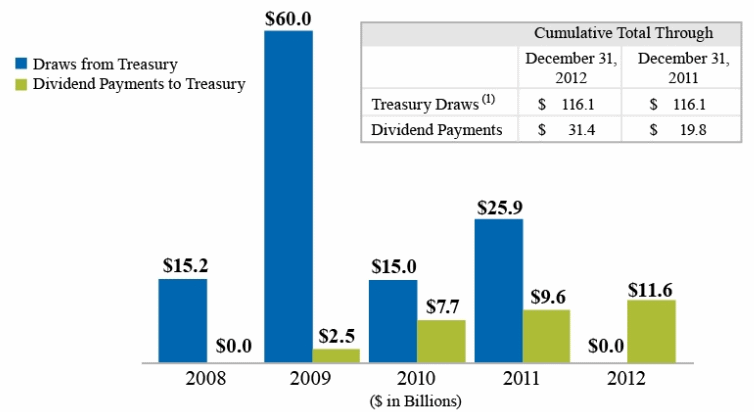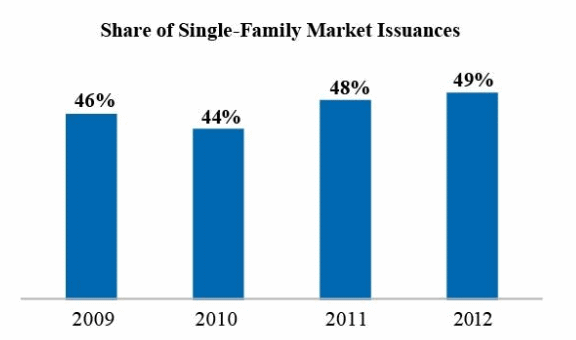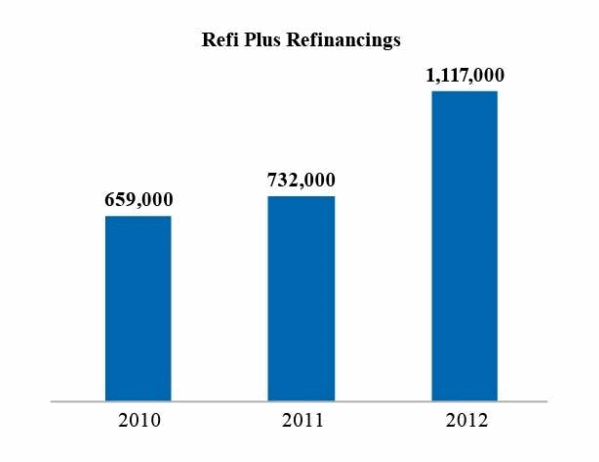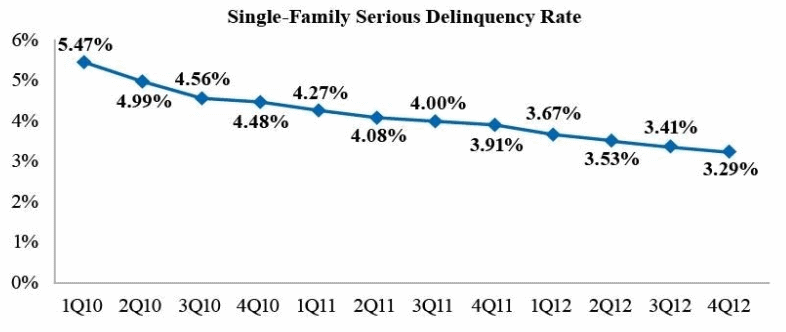Fannie Mae reported today that it had pre-tax income of $8.1 billion in the first quarter of 2013, the largest quarterly results in the company's history. In the fourth quarter of 2012 the company reported pre-tax income of $7.57 billion. Based on its net worth at the end of the first quarter of $62.4 billion the company's dividend obligation to the U.S. Treasury will be $59.4 billion, a staggering $52.4 billion more than the analogous dividend reported by Freddie Mac Yesterday.
Payment of that dividend during the quarter will bring the total dividends to Treasury since Fannie Mae entered conservatorship in September 2008 to $95.0 billion. The company has drawn $116.1 billion in support through draws on the Treasury during but will not request a draw based on its Q1 results. Dividend payments from Fannie Mae do not lower its obligations to the Treasury which still maintains a liquidation preference of $117.1 billion on the company's senior preferred stock.

Based on analysis of all relevant factors, Fannie Mae determined that the release of the valuation allowance on its deferred tax assets was appropriate under generally accepted accounting principles. This resulted in a benefit for federal income taxes of $50.6 billion and in net income of $58.7 billion compared to $7.6 billion in the fourth quarter of 2012 and $2.7 billion in the first quarter of 2012. Comprehensive income was $59.3 billion compared to $3.1 billion in the first quarter of 2012.
The company attributed the improved results to strong credit results driven by an increase in home prices including higher sales prices for owned real estate (REO). Also credited were a decline in the number of delinquent loans and the company's resolution agreement with Bank of America.
Net interest income in the first quarter was $6.30 billion, up from $5.56 billion in Q4 and $5.2 billion a year earlier. Total credit-related income was 1.22 billion compared to $2.37 billion the previous quarter and ($2.85) billion in credit expenses a year earlier.
The resolution agreement with Bank of America was related to repurchase requests and led to the recognition of approximately $800 million in pre-tax income for the first quarter of 2013. Fannie Mae expects to recognize pre-tax income in future periods relating to a separate resolution agreement with the Bank on compensatory fees.
Fannie Mae remained the largest single issuer of single-family mortgage-related securities in the secondary market in the first quarter of 2013, with an estimated market share of new single-family mortgage-related securities issuances of 48 percent, compared with 48 percent in the fourth quarter of 2012 and 51 percent in the first quarter of 2012.

During the first quarter Fannie Mae acquired approximately 330,000 loans including those financed through the Home Affordable Refinance Program (HARP). Even though some borrowers payments increased when they took advantage of incentives to choose shorter loan terms, refinanced loans delivered to the company during the period reduced borrower monthly payments by an average of $256.

Fannie Mae alsoremained a constant source of liquidity in the multifamily market. As of December 31, 2012 (the latest date for which information is available), the company owned or guaranteed approximately 22 percent of the total outstanding debt on multifamily properties.
As of March 31, 2013, 69 percent of Fannie Mae's single-family guaranty book of business consisted of loans purchased or guaranteed since the beginning of 2009. These loans have substantially higher credit scores, and lower debt-to-income ratios and Fannie Mae expects that they will, in the aggregate, be profitable over their lifetime. These stronger loans, along with Fannie Mae's home retention solutions, foreclosure alternatives, and completed foreclosures have contributed to a steadily declining serious delinquency rate each quarter since the first quarter of 2010. The rate was 3.02 as of March 31, 2013 compared with 5.47 percent as of March 31, 2010.

Fannie Mae completed more than 43,000 loan modifications during the first quarter, bringing the total to approximately 922,000 since the beginning of 2009. Other foreclosure avoidance solutions such as short sales have brought the total of homeowners assisted during that period to 1.3 million.
Fannie Mae acquired 38,717 single-family REO properties, primarily through foreclosure, in the first quarter of 2013, compared with 41,112 in the fourth quarter of 2012. As of March 31, 2013, the company's inventory of single-family REO properties was 101,449, compared with 105,666 as of December 31, 2012. The carrying value of the company's single-family REO was $9.3 billion as of March 31, 2013.
Financial results for each of Fannie Mae's three reporting segments were are follows (Increased net income was in all cases due in part to the release of the company's valuation allowance against its deferred tax assets):. :
- Single-Family: Net income of $34.9 billion in the first quarter compared to $4.0 billion in the fourth quarter of 2012. Pre-tax income was $3.3 billion, down from $4.0 billion the previous quarter due primarily to lower credit-related income. The Single-Family guaranty book of business was $2.84 trillion as of March 31, 2013, compared with $2.83 trillion as of December 31, 2012. Single-Family guaranty fee income was $2.4 billion in the first quarter of 2013 and $2.3 billion in the fourth quarter of 2012.
- Multifamily had net income of $8.5 billion in the first quarter of 2013, compared with $447 million in the fourth quarter of 2012. Pre-tax income was $511 million, compared with $447 million in the fourth quarter of 2012, primarily due to improvement in credit-related income. The Multifamily guaranty book of business was $205.4 billion as of March 31, 2013, compared with $206.2 billion as of December 31, 2012. Multifamily recorded credit-related income of $183 million in the first quarter of 2013, compared with credit-related expense of $54 million in the fourth quarter of 2012. Multifamily guaranty fee income was $291 million for the first quarter of 2013 and $280 million for the fourth quarter of 2012.
- Capital Markets group had net income of $15.9 billion in the first quarter of 2013, compared with $4.3 billion in the fourth quarter of 2012. Capital Markets had pre-tax income of $4.9 billion, compared with $4.3 billion in the fourth quarter of 2012. The increase in pre-tax income in the first quarter of 2013 compared with the fourth quarter of 2012 was due primarily to an increase in fair value gains. Capital Markets' net interest income for the first quarter of 2013 was $2.7 billion, compared with $3.0 billion for the fourth quarter of 2012. Fair value gains for the first quarter of 2013 were $875 million, compared with $211 million in the fourth quarter of 2012. The Capital Markets retained mortgage portfolio balance decreased to $597.8 billion as of March 31, 2013, compared with $633.1 billion as of December 31, 2012, resulting from purchases of $81.7 billion, liquidations of $41.8 billion, and sales of $75.2 billion during the quarter.







